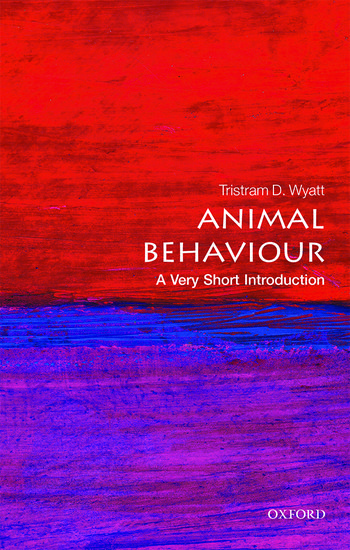Home >
A Very Short Introduction >
Animal Behaviour (Psychology)
A Very Short Introduction | Psychology
Animal Behaviour
ISBN: 9780198712152
Series: A Very Short Introduction
Animal Behaviour (Psychology)
A Very Short Introduction Animal Behaviour (Psychology) Media > Books > Non-Fiction > Education Books Expect Delays of Up to 4 Weeks| Order Below |
ISBN
9780198712152 (10-digit ISBN: 0198712154)
- Description
- Key Features
- Series Description
- Table of Contents
- Introduces the field of animal behaviour, and the tools modern scientists can use to understand animals such as image analysis
- Discusses key concepts such as the roles of nature, nurture, epigenetics, and the 'selfish gene'
- Covers a wide range of animals, from meerkats to moths, using examples to introduce the theory underlying our modern understanding of animal behaviour
- Integrates studies from natural history and bird-watching with the influences of molecular biology and neuroscience on behaviour
How animals behave is crucial to their survival and reproduction. The application of new molecular tools such as DNA fingerprinting and genomics is causing a revolution in the study of animal behaviour, while developments in computing and image analysis allow us to investigate behaviour in ways never previously possible. By combining these with the traditional methods of observation and experiments, we are now learning more about animal behaviour than ever before.In this Very Short Introduction Tristram D. Wyatt discusses how animal behaviour has evolved, how behaviours develop in each individual (considering the interplay of genes, epigenetics, and experience), how we can understand animal societies, and how we can explain collective behaviour such as swirling flocks of starlings. Using lab and field studies from across the whole animal kingdom, he looks at mammals, butterflies, honeybees, fish, and birds, analysing what drives behaviour, and exploring instinct, learning, and culture. Looking more widely at behavioural ecology, he also considers some aspects of human behaviour.
Oxford's Very Short Introductions series offers concise and original introductions to a wide range of subjects--from Islam to Sociology, Politics to Classics, Literary Theory to History, and Archaeology to the Bible.
Not simply a textbook of definitions, each volume in this series provides trenchant and provocative--yet always balanced and complete--discussions of the central issues in a given discipline or field. Every Very Short Introduction gives a readable evolution of the subject in question, demonstrating how the subject has developed and how it has influenced society. Eventually, the series will encompass every major academic discipline, offering all students an accessible and abundant reference library.
Whatever the area of study that one deems important or appealing, whatever the topic that fascinates the general reader, the Very Short Introductions series has a handy and affordable guide that will likely prove indispensable.
Please note: As this series is not ELT material, these titles are not subject to discount.
1: How animals behave (and why)
2: Sensing and responding
3: How behaviour develops
4: Learning and animal culture
5: Signals for survival
6: Winning strategies
7: The wisdom of crowds
8: Applying behaviour
References
Further Reading
Index
How animals behave is crucial to their survival and reproduction. The application of new molecular tools such as DNA fingerprinting and genomics is causing a revolution in the study of animal behaviour, while developments in computing and image analysis allow us to investigate behaviour in ways never previously possible. By combining these with the traditional methods of observation and experiments, we are now learning more about animal behaviour than ever before.In this Very Short Introduction Tristram D. Wyatt discusses how animal behaviour has evolved, how behaviours develop in each individual (considering the interplay of genes, epigenetics, and experience), how we can understand animal societies, and how we can explain collective behaviour such as swirling flocks of starlings. Using lab and field studies from across the whole animal kingdom, he looks at mammals, butterflies, honeybees, fish, and birds, analysing what drives behaviour, and exploring instinct, learning, and culture. Looking more widely at behavioural ecology, he also considers some aspects of human behaviour.
Key Features
- Introduces the field of animal behaviour, and the tools modern scientists can use to understand animals such as image analysis
- Discusses key concepts such as the roles of nature, nurture, epigenetics, and the 'selfish gene'
- Covers a wide range of animals, from meerkats to moths, using examples to introduce the theory underlying our modern understanding of animal behaviour
- Integrates studies from natural history and bird-watching with the influences of molecular biology and neuroscience on behaviour
Series Description
Oxford's Very Short Introductions series offers concise and original introductions to a wide range of subjects--from Islam to Sociology, Politics to Classics, Literary Theory to History, and Archaeology to the Bible.
Not simply a textbook of definitions, each volume in this series provides trenchant and provocative--yet always balanced and complete--discussions of the central issues in a given discipline or field. Every Very Short Introduction gives a readable evolution of the subject in question, demonstrating how the subject has developed and how it has influenced society. Eventually, the series will encompass every major academic discipline, offering all students an accessible and abundant reference library.
Whatever the area of study that one deems important or appealing, whatever the topic that fascinates the general reader, the Very Short Introductions series has a handy and affordable guide that will likely prove indispensable.
Please note: As this series is not ELT material, these titles are not subject to discount.
EASY ORDER FORM
PRICES LISTED INCLUDE CONSUMPTION TAX
Price Before Tax:
¥1,790


